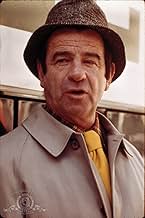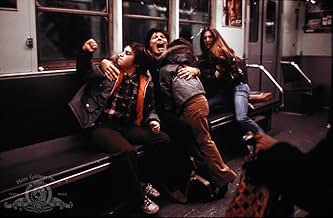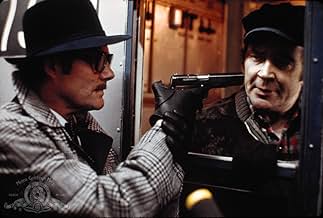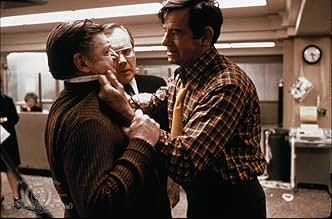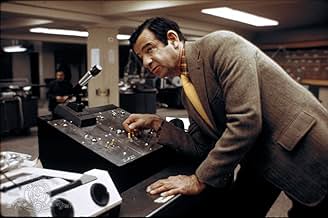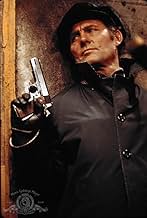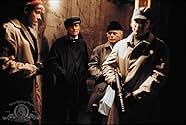À New York, des hommes armés détournent une rame de métro et demandent une rançon pour les passagers. Même si c'est payé, comment pourraient-ils s'en sortir?À New York, des hommes armés détournent une rame de métro et demandent une rançon pour les passagers. Même si c'est payé, comment pourraient-ils s'en sortir?À New York, des hommes armés détournent une rame de métro et demandent une rançon pour les passagers. Même si c'est payé, comment pourraient-ils s'en sortir?
- Réalisation
- Scénario
- Casting principal
- Nomination aux 2 BAFTA Awards
- 3 nominations au total
Kenneth McMillan
- Borough Commander
- (as Kenneth Mc Millan)
Avis à la une
The Taking of Pelham One Two Three is one of those films plundered by movie magpie Quentin Tarantino, the director stealing the whole 'criminals with colours instead of names' idea for his debut Reservoir Dogs. It's easy to see why Pelham would appeal to QT: it's a gritty '70s thriller with a cool cult following, focusing on a group of violent ne'er-do-wells who carry out a daring hijack on a New York subway train. The dialogue is snappy, the cast is excellent, and David Shire's music is big, bold, brassy and badass.
Leading the hijackers is Robert Shaw, whose cold, calculating Mr. Blue is truly chilling; on the side of the law is Transit Police Lt. Zachary Garber, played by Walter Matthau, whose job it is to converse with the criminals whilst trying to figure out who they are and how they plan to make their escape. Much of the movie consists of exchanges of dialogue between the two men, but don't make the mistake of thinking this is a dull blab-fest: the tension runs high throughout, the race to deliver the ransom money against the clock being a particularly exciting highlight. And with one of the hijackers a dangerous loose cannon (Hector Elizondo's Mr. Grey, surely the inspiration for Michael Madsen's Mr. Blonde), the potential for the loss of innocent life is ever present.
A thrilling final act sees the train speeding out of control with the terrified passengers still on board, the gang having disembarked between stations. Meanwhile, Garber and his men tighten the net, and one-by-one the hijackers pay for their crime, with one death proving very shocking indeed. The fun continues right up to the final frame, an amusing ending that is nothing to be sneezed at.
Leading the hijackers is Robert Shaw, whose cold, calculating Mr. Blue is truly chilling; on the side of the law is Transit Police Lt. Zachary Garber, played by Walter Matthau, whose job it is to converse with the criminals whilst trying to figure out who they are and how they plan to make their escape. Much of the movie consists of exchanges of dialogue between the two men, but don't make the mistake of thinking this is a dull blab-fest: the tension runs high throughout, the race to deliver the ransom money against the clock being a particularly exciting highlight. And with one of the hijackers a dangerous loose cannon (Hector Elizondo's Mr. Grey, surely the inspiration for Michael Madsen's Mr. Blonde), the potential for the loss of innocent life is ever present.
A thrilling final act sees the train speeding out of control with the terrified passengers still on board, the gang having disembarked between stations. Meanwhile, Garber and his men tighten the net, and one-by-one the hijackers pay for their crime, with one death proving very shocking indeed. The fun continues right up to the final frame, an amusing ending that is nothing to be sneezed at.
Modern tough-guy filmmakers like Quentin Tarentino acknowledge their debt to this pedal-to-the-metal thriller, directed by Joseph Sargent from John Godey's bestseller. Walter Matthau is a hoot as the savvy NY transit cop who's smarter than he looks, well-matched by Robert Shaw as the icy mercenary whose gang has hijacked a subway car for a one-million-dollar ransom.
This film's been imitated so often because its makers were really at the top of their game. Owen Roizman (THE FRENCH CONNECTION) handled the gritty location photography; scripter Peter Stone contributed terse, funny dialogue; scene-stealers like Martin Balsam, Jerry Stiller, Dick O'Neill and others made their roles indelible; and David Shire's percussive score set a standard for the genre.
The ending is classic. When you have Matthau as your star, this is how to end your movie.
This film's been imitated so often because its makers were really at the top of their game. Owen Roizman (THE FRENCH CONNECTION) handled the gritty location photography; scripter Peter Stone contributed terse, funny dialogue; scene-stealers like Martin Balsam, Jerry Stiller, Dick O'Neill and others made their roles indelible; and David Shire's percussive score set a standard for the genre.
The ending is classic. When you have Matthau as your star, this is how to end your movie.
There are many disappointing action pictures out there – this is not one of them. The genius of the film is there is no wasted motion. The picture starts right with the plot – no introduction or character development. The characters are allowed to develop as the plot moves along.
Which brings us to pacing – the pacing in this picture is excellent. It moves right along and never stops, never slows, never goes too fast. This is the strongest element of its success.
Another strength is its economy of motion. Many action pictures bore us with unneeded car chase scenes, shoot-em-ups, explosions and other mayhems that are used as filler when true creativity comes up short. This film needs none of that. Only that which is necessary is shown. Only that which needs speaking is spoken. This film is deftly written and crafted with great economy and this underpins the excellent pacing. It moves right along because there is no wasted motion as there is in most other action pictures.
This does not mean there is no action, there is fabulous action, but only such action as is necessary to move the plot along. There is no action simply to occupy time until the requisite 90 minutes are up.
The directing is equally economical. No fancy shots, shaky cameras, or special effects – just good, straight forward directing.
I doubt this picture could be made today for the above reasons. The script readers would reject it for 'lack of development'; 'not enough action'; 'no romantic interest'; and all the other brainless formulas script readers dole out. The producers would demand 'more action' and 'camera work' from the directors. And, of course, a romantic interest (in some state of undress) would have to be shoe horned in.
Film students should study this picture. From it they will learn that brevity is a virtue and mindless formulas are just that - mindless.
Which brings us to pacing – the pacing in this picture is excellent. It moves right along and never stops, never slows, never goes too fast. This is the strongest element of its success.
Another strength is its economy of motion. Many action pictures bore us with unneeded car chase scenes, shoot-em-ups, explosions and other mayhems that are used as filler when true creativity comes up short. This film needs none of that. Only that which is necessary is shown. Only that which needs speaking is spoken. This film is deftly written and crafted with great economy and this underpins the excellent pacing. It moves right along because there is no wasted motion as there is in most other action pictures.
This does not mean there is no action, there is fabulous action, but only such action as is necessary to move the plot along. There is no action simply to occupy time until the requisite 90 minutes are up.
The directing is equally economical. No fancy shots, shaky cameras, or special effects – just good, straight forward directing.
I doubt this picture could be made today for the above reasons. The script readers would reject it for 'lack of development'; 'not enough action'; 'no romantic interest'; and all the other brainless formulas script readers dole out. The producers would demand 'more action' and 'camera work' from the directors. And, of course, a romantic interest (in some state of undress) would have to be shoe horned in.
Film students should study this picture. From it they will learn that brevity is a virtue and mindless formulas are just that - mindless.
One of my favorite films from the seventies is The Taking of Pelham One, Two Three because it's so New York. Of course the film was shot entirely on location in The Big Apple including the interiors which helped greatly. But more than that, the characters have all the New York flavor about them with one exception.
The cat of course is led by Walter Matthau who plays a Transit Police Lieutenant. His character is a kind of combination of Archie Bunker and Detective Lennie Briscoe from Law and Order, in many ways not terribly admirable. He's also a transit cop and at that time the Transit Police were a separate entity. They were merged into the regular NYPD during the Giuliani administration.
There's no real glory in the Transit Police, these guys were mostly charged with dealing with drunks and kids with loud boom boxes. If a homicide ever occurred the NYPD quickly took it over as they would in most situations. But this ongoing crisis on a train on the Lexington Avenue Local occurs on his watch and it's career make or break case that Matthau is very aware of. And he proves fully capable during the crisis.
The crisis is four men, Robert Shaw, Earl Hindman, Hector Elizondo, and Martin Balsam mount a carefully planned assault on a subway train out of Pelham Bay station in the Bronx in mid-Manhattan and hold it and the passengers for ransom for a million dollars. The outsider to New York is Robert Shaw in one of his best roles, a former British army officer and mercenary. During the course of the robbery they kill a station supervisor played by roly poly Tom Pedi, one very quintessential New Yorker and their coldblooded villainy is established.
In fact the whole cast is a microcosm of the ethnic strains of New York City which makes the film so enjoyable, especially to one who lived there, the first 49 years of his life. Even the mayor is portrayed as a weak, fumbling nonentity and back then our mayor was one Abraham D. Beame who was just that, probably one of the worst mayors the city ever had. Tony Roberts has a very good role as the tough as nails Deputy Mayor concerned about both his boss's political career and resolving the crisis.
The Taking of Pelham One Two Three once the hijack is done is suspense filled and doesn't let up for a moment. I can't give the ending away, but the final shot of Walter Matthau's face as the end title music starts and the credits begin to roll is priceless.
The cat of course is led by Walter Matthau who plays a Transit Police Lieutenant. His character is a kind of combination of Archie Bunker and Detective Lennie Briscoe from Law and Order, in many ways not terribly admirable. He's also a transit cop and at that time the Transit Police were a separate entity. They were merged into the regular NYPD during the Giuliani administration.
There's no real glory in the Transit Police, these guys were mostly charged with dealing with drunks and kids with loud boom boxes. If a homicide ever occurred the NYPD quickly took it over as they would in most situations. But this ongoing crisis on a train on the Lexington Avenue Local occurs on his watch and it's career make or break case that Matthau is very aware of. And he proves fully capable during the crisis.
The crisis is four men, Robert Shaw, Earl Hindman, Hector Elizondo, and Martin Balsam mount a carefully planned assault on a subway train out of Pelham Bay station in the Bronx in mid-Manhattan and hold it and the passengers for ransom for a million dollars. The outsider to New York is Robert Shaw in one of his best roles, a former British army officer and mercenary. During the course of the robbery they kill a station supervisor played by roly poly Tom Pedi, one very quintessential New Yorker and their coldblooded villainy is established.
In fact the whole cast is a microcosm of the ethnic strains of New York City which makes the film so enjoyable, especially to one who lived there, the first 49 years of his life. Even the mayor is portrayed as a weak, fumbling nonentity and back then our mayor was one Abraham D. Beame who was just that, probably one of the worst mayors the city ever had. Tony Roberts has a very good role as the tough as nails Deputy Mayor concerned about both his boss's political career and resolving the crisis.
The Taking of Pelham One Two Three once the hijack is done is suspense filled and doesn't let up for a moment. I can't give the ending away, but the final shot of Walter Matthau's face as the end title music starts and the credits begin to roll is priceless.
It is my belief that the finest era for films was the 1970's. Consider all the classics that were produced in that era (Godfather I and II, Patton, The Sting, Jaws, Mean Streets, The Exorcist, The French Connection, Star Wars etc). My belief was recently validated by Jodie Foster, who essentially said the same thing. One of the reasons why the films were great was that the directors were ostensibly in control of the films, rather than by a committee of the usual Hollywood "insiders" who think they know what people want to see, but rarely make the correct decisions.
I know that this film was re-made( for TV)--God knows why--but I'm sure if they attempted another film version Matt Damon would be playing the grizzled transit police cop (Matthau's role) and Jude Law would be playing the Robert Shaw role. That's another reason why the original and other films of the 70's were so great: the casting was more believable. Today Hollywood is so incredibly youth-obsessed that actors are completely miscast.
I am not stating that this is another 70's classic, but even this film is far superior to many of today's films. And yet, I'll bet you couldn't find "Pelham" in your local video store.
I love several things about this film. The first thing to hit you is that wonderful, funky score that in some parts sounds like controlled chaos. I love the script, which is not completely dark despite the underlying theme, as there are some very funny moments throughout the film: for instance, the chagrined look on Matthau's face when he discovers the Japanese visitors can speak English.
There are many examples of mistaken identity in this film: the supervisor who is gunned down is called "goombah", but he isn't Italian; Matthau thinks the black police captain is white over the radio; Matthau mistakes the long-haired undercover cop (who was shot on the train tracks) for a female. I also love the character who plays the mayor, who unbelievably bears a striking resemblance to Mayor Koch, who was elected 3 years later!!!! All in all a great action film, and one that will hold up for years.
Addendum: Well, they're doing it--they're re-making this film because Hollywood is almost completely bereft of new ideas (see "Josie and the Pussycats" "Bewitched" the upcoming "I Dream of Jeannie"). I half-expect they will remake "The Paper Chase" next with P.Diddy as Professor Kingsfield.
I know that this film was re-made( for TV)--God knows why--but I'm sure if they attempted another film version Matt Damon would be playing the grizzled transit police cop (Matthau's role) and Jude Law would be playing the Robert Shaw role. That's another reason why the original and other films of the 70's were so great: the casting was more believable. Today Hollywood is so incredibly youth-obsessed that actors are completely miscast.
I am not stating that this is another 70's classic, but even this film is far superior to many of today's films. And yet, I'll bet you couldn't find "Pelham" in your local video store.
I love several things about this film. The first thing to hit you is that wonderful, funky score that in some parts sounds like controlled chaos. I love the script, which is not completely dark despite the underlying theme, as there are some very funny moments throughout the film: for instance, the chagrined look on Matthau's face when he discovers the Japanese visitors can speak English.
There are many examples of mistaken identity in this film: the supervisor who is gunned down is called "goombah", but he isn't Italian; Matthau thinks the black police captain is white over the radio; Matthau mistakes the long-haired undercover cop (who was shot on the train tracks) for a female. I also love the character who plays the mayor, who unbelievably bears a striking resemblance to Mayor Koch, who was elected 3 years later!!!! All in all a great action film, and one that will hold up for years.
Addendum: Well, they're doing it--they're re-making this film because Hollywood is almost completely bereft of new ideas (see "Josie and the Pussycats" "Bewitched" the upcoming "I Dream of Jeannie"). I half-expect they will remake "The Paper Chase" next with P.Diddy as Professor Kingsfield.
Le saviez-vous
- AnecdotesIn a TVO (Ontario, Canada) interview, the producer said that this film did terrific box office in New York, Toronto, London and Paris--all cities with subways--but was considered a flop in the rest of the world.
- GaffesThe relevant section of the Lexington Avenue Line includes curves sharp enough to have speed-controlled signals. As Mr. Green would have known, these cannot be cleared to green in advance of the train's arrival and will not clear if it is running away.
- Citations
Lt. Garber: [looking for the inspector] Inspector Daniels?
Inspector Daniels: [identifying himself] Daniels.
Lt. Garber: [realizing that Inspector Daniels is Black] Oh, I, uh, thought you were, uh, like a shorter guy or... I don't know what I thought.
- Crédits fousAlthough many of the scenes in this film were taken on transit property, the New York City Transit Authority is not responsible for plot, story and characters portrayed. The Authority did not render technical advice and assistance.
- ConnexionsEdited into Superman III (1983)
Meilleurs choix
Connectez-vous pour évaluer et suivre la liste de favoris afin de recevoir des recommandations personnalisées
Détails
- Date de sortie
- Pays d’origine
- Langues
- Aussi connu sous le nom de
- El tomar de Pelham uno dos tres
- Lieux de tournage
- Gracie Mansion, Manhattan, Ville de New York, New York, États-Unis(mayor's home - exteriors)
- Sociétés de production
- Voir plus de crédits d'entreprise sur IMDbPro
Box-office
- Budget
- 5 000 000 $US (estimé)
- Montant brut mondial
- 357 $US
Contribuer à cette page
Suggérer une modification ou ajouter du contenu manquant


